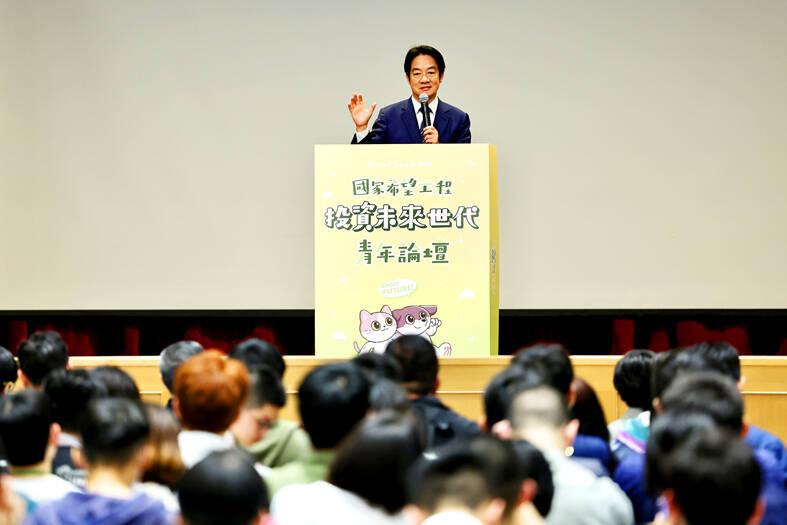President-elect William Lai’s (賴清德) plan to deepen ties with Southeast Asian countries after taking office might be challenging due to China’s growing influence in the region, the Nikkei Asia said on Saturday.
Lai is poised to build on President Tsai Ing-wen’s (蔡英文) legacy and continue to foster deeper engagement with Southeast Asia after his inauguration on May 20, the Nikkei Asia reported.
“The new government will continue the good foundation and results of the New Southbound Policy and continue to deepen relations with Southeast Asian and South Asian countries,” Ministry of Foreign Affairs spokesman Jeff Liu (劉永健) was quoted by the Nikkei Asia as saying.

Photo: CNA
Deepening relations with Southeast Asian and Indo-Pacific countries has been a long-term objective of the Ministry of Foreign Affairs, he said.
Tsai launched the New Southbound Policy in 2016 to strengthen Taiwan’s relations with 18 nations — Australia, Bangladesh, Bhutan, Brunei, Cambodia, India, Indonesia, Laos, Malaysia, Myanmar, Nepal, New Zealand, Pakistan, Philippines, Singapore, Sri Lanka, Thailand and Vietnam — through economic and trade collaboration, talent exchanges, resource sharing and regional connectivity, the Executive Yuan said.
None of the 18 nations has formal diplomatic ties with Taiwan.
Taipei last year approved US$5.54 billion of investments under the New Southbound Policy, exceeding that in China for the second consecutive year, the Executive Yuan’s Office of Trade Negotiations said.
Minister of Economic Affairs Wang Mei-hua (王美花) was quoted by the Nikkei Asia as saying that “the trend will only continue because of the push from the US-China trade tensions.”
Chong Ja Ian (莊嘉穎), a political science professor at National University of Singapore and a nonresident scholar at Carnegie China, said that the engagement “remains largely focused on commercial interaction.”
However, Southeast Asian countries’ “reluctance to antagonize China by being seen to be close to Taipei” has proved an obstacle to the nation’s effort to deepen ties with them, the paper said.
The governments as well as societal and commercial actors are “cautious about demonstrating interest in Taiwan,” Chong said.
Taiwan has been striving to bolster people-to-people exchanges with Southeast Asian nations by relaxing visa rules and offering more university scholarships, the paper said.
Whether to continue attracting students or recruiting talent to work in Taiwan from these countries would be challenging for the new president as “Chinese influence is on the rise in Southeast Asia,” it said.
Polling conducted by the ISEAS-Yusof Ishak Institute as part of its State of Southeast Asia 2024 Survey showed that more than half of respondents, 50.5 percent, from Southeast Asian nations favored China over the US.
The survey also found a growing sense of optimism among Southeast Asian respondents regarding their nation’s future relations with China, with 51.4 percent anticipating improvement, up from 38.7 percent the previous year.

CAUTION: Based on intelligence from the nation’s security agencies, MOFA has cautioned Taiwanese travelers about heightened safety risks in China-friendly countries The Ministry of Foreign Affairs (MOFA) yesterday urged Taiwanese to be aware of their safety when traveling abroad, especially in countries that are friendly to China. China in June last year issued 22 guidelines that allow its courts to try in absentia and sentence to death so-called “diehard” Taiwanese independence activists, even though Chinese courts have no jurisdiction in Taiwan. Late last month, a senior Chinese official gave closed-door instructions to state security units to implement the guidelines in countries friendly to China, a government memo and a senior Taiwan security official said, based on information gathered by Taiwan’s intelligence agency. The

Taiwan Semiconductor Manufacturing Co (TSMC), the world’s largest contract chipmaker, said yesterday that it is looking to hire 8,000 people this year, at a time when the tech giant is expanding production capacity to maintain its lead over competitors. To attract talent, TSMC would launch a large-scale recruitment campaign on campuses across Taiwan, where a newly recruited engineer with a master’s degree could expect to receive an average salary of NT$2.2 million (US$60,912), which is much higher than the 2023 national average of NT$709,000 for those in the same category, according to government statistics. TSMC, which accounted for more than 60 percent

The National Immigration Agency (NIA) said yesterday that it will revoke the dependent-based residence permit of a Chinese social media influencer who reportedly “openly advocated for [China’s] unification through military force” with Taiwan. The Chinese national, identified by her surname Liu (劉), will have her residence permit revoked in accordance with Article 14 of the “Measures for the permission of family- based residence, long-term residence and settlement of people from the Mainland Area in the Taiwan Area,” the NIA said in a news release. The agency explained it received reports that Liu made “unifying Taiwan through military force” statements on her online

Tung Tzu-hsien (童子賢), a Taiwanese businessman and deputy convener of the nation’s National Climate Change Committee, said yesterday that “electrical power is national power” and nuclear energy is “very important to Taiwan.” Tung made the remarks, suggesting that his views do not align with the country’s current official policy of phasing out nuclear energy, at a forum organized by the Taiwan People’s Party titled “Challenges and Prospects of Taiwan’s AI Industry and Energy Policy.” “Taiwan is currently pursuing industries with high added- value and is developing vigorously, and this all requires electricity,” said the chairman